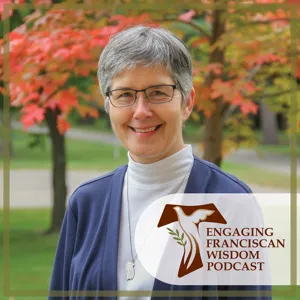Crossing cultures & creating spaces for belonging in daily life - Episode 52

Join Dr. Patty Jimenez as she shares the joys of being raised with Franciscan values, translates theological terms and teachings into everyday language, and the creates spaces of belonging for young Latina woman raised in the United States.
For a video version of this episode, see: https://youtu.be/etFD7Z-4Vsw
From Patty Jimenez’ interview:
“When I returned to school I am reading Bonaventure, Scotus, and Francis and Clare's writings, I'm going, some of this stuff is pretty lofty. But when I broke it down to the essentials of hospitality, of care for creation, this is what my family lived every day, especially the women in my family; it was really powerful to see that written theologically, to see that expressed and be like, oh yeah, this is us.”
Regarding moving between cultures: “I think first is to not make assumptions. It's really important to ask a lot of questions. Oftentimes people just kind of jump in based on what is on the surface level, but they don't really know what's behind it. … I've seen that happen over and over again in so many situations, making assumptions about other people without taking consideration about what we are doing or not doing that is causing what's happening.”
“When you deal with a lot of cross-cultural issues, oftentimes just feeling heard causes a shift. That's sometimes all people need, is to be heard.”
“We all belong. If we've ever felt that we didn't, it's usually because we haven't been adequately provided for or cared for. That has resonated for me as a Latina that's been raised here in the United States. And so I take a huge responsibility now of how do I create belonging for US born and raised Latinas. At times we have to, if we feel like, ‘hey, I don't belong’, maybe it's the Spirit that's moving us to create spaces of belonging for others.”
Vernacular theologian: “How do you translate really lofty theological terms or teachings into everyday terms so that anyone can understand it? And so for me it's translated in what we Latina theologians or pastor ministers speak of la vida cotidiana, our everyday life. And so how do we integrate it and speak in a language that is accessible to most people nowadays?”
For a full transcript, please include episode number and email: fslfpodcast@fslf.org.
References:
Brother Ed Dunn and las Posadas at the Border: read about the impact of the San Diego and Tijuana border experience in Patty’s life: http://www.ushispanicministry.com/la-posada-at-the-border/
Franciscan School of Theology: “There is a hidden treasure in Catholic Theology called the “Franciscan Tradition.” As Pope Francis reminds us, St. Francis of Assisi is a saint of peace, a saint of the poor, a saint respectful of each person’s God-given uniqueness, and a saint with a great love for all God’s creatures.” See: https://www.fst.edu/about/
Secular Franciscans: https://www.secularfranciscansusa.org/ . You may also find it interesting to listen to Carolyn Townes’ reflections on being a Secular Franciscan in Episode 27, including links to further information at https://engagingfranciscanwisdom.org/walking-the-path-of-grief-and-loss-to-joy-as-a-lay-franciscan-episode-27
Francis and the Sultan: a contemporary telling of the story: https://cac.org/francis-and-the-sultan-2019-10-10/ . An original source: The Life of Saint Francis XX:57, by Thomas of Celano at: https://www.franciscantradition.org/francis-of-assisi-early-documents/the-saint/the-life-of-saint-francis-by-thomas-of-celano/672-fa-ed-1-page-231#ges:searchword%3Dsultan%26searchphrase%3Dall%26page%3D1
Wolf of Gubbio: read in The Deeds of Blessed Francis & His Companions XXIII, FA:ED, vol. 3, pp. 482-485 at: https://www.franciscantradition.org/francis-of-assisi-early-documents/the-prophet/the-deeds-of-blessed-francis-and-his-companions-1328-1337/2386-fa-ed-3-page-485
Restorative Justice: there is much information online. A sample description: “The three core elements of restorative justice are the interconnected concepts of Encounter, Repair, and Transform. Each element is discrete and essential. Together they represent a journey toward wellbeing and wholeness that victims, offenders, and community members can experience. Encounter leads to repair, and repair leads to transformation.” See: https://restorativejustice.org/what-is-restorative-justice/
Recetas: This initiative, founded by Patty, is dedicated to empowering Latinas to live joyous, well-balanced lives while deepening connections with themselves, their community, and their culture. Consider seven areas of wellness: emotional, environmental, personal, physical, professional, psychological and spiritual. See: https://recetonas.com . To see their shop: https://shop.recetonas.com . Handles for all social media: @therecetonas
Centering Prayer is a contemporary form of contemplative prayer. See: http://www.contemplativeoutreach.org/. Consider also a smart phone app called “Centering Prayer,” offered by Contemplative Outreach. You will find many regional websites online listing area centering prayer groups. For those who live in Minnesota, see: https://www.minnesotacontemplativeoutreach.org/groups.html
Vernacular Theology: “Bernard McGinn … coined the term Vernacular Theology. This form of theology focused on an audience of ordinary women and men who sought to find God in their daily experiences instead of the educated elite or the monks and nuns in the enclosure.” Excerpt from Francis as Vernacular Theologian by Dominic Monti, OFM: https://www.franciscantradition.org/images/stories/custodians/03_Francis_as_Vernacular_Theologian.pdf

Patty Catholic School photo

Patty Jimenez being confirmed in Mexico








